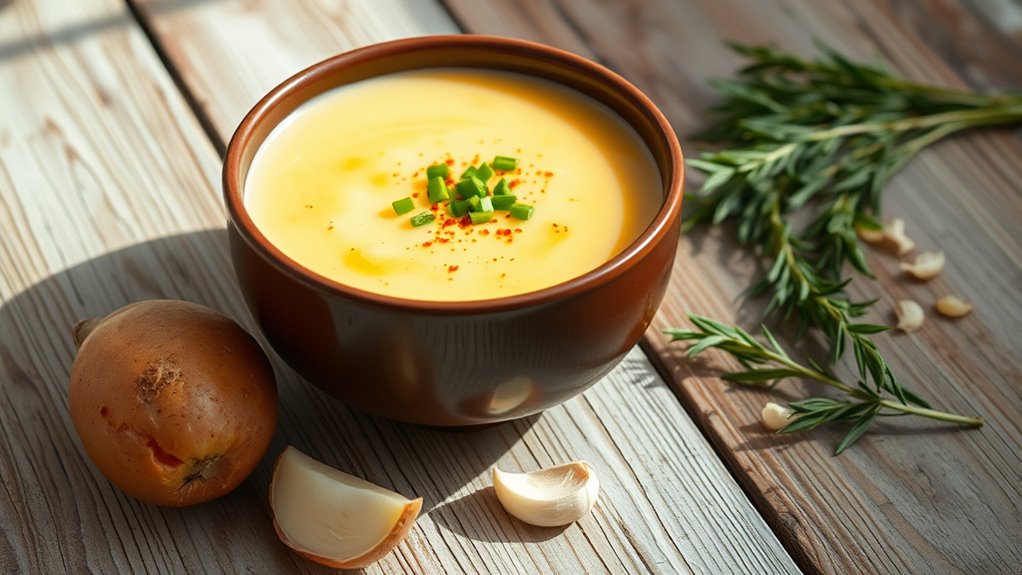This dairy-free potato soup sticks to a creamy texture using stock and careful starch release, not milk. Start with 1.5–2 pounds potatoes, a chopped onion, and garlic in a sturdy pot, then simmer in 4 cups stock until tender. Blend part of the potatoes for body, or puree fully for smoothness, and finish with a splash of milk-free thickener like a bit of cream-style dairy substitute or mashed potatoes. You’ll get a comforting, balanced bowl—and more tips await if you keep exploring.
Ingredients and Quantity
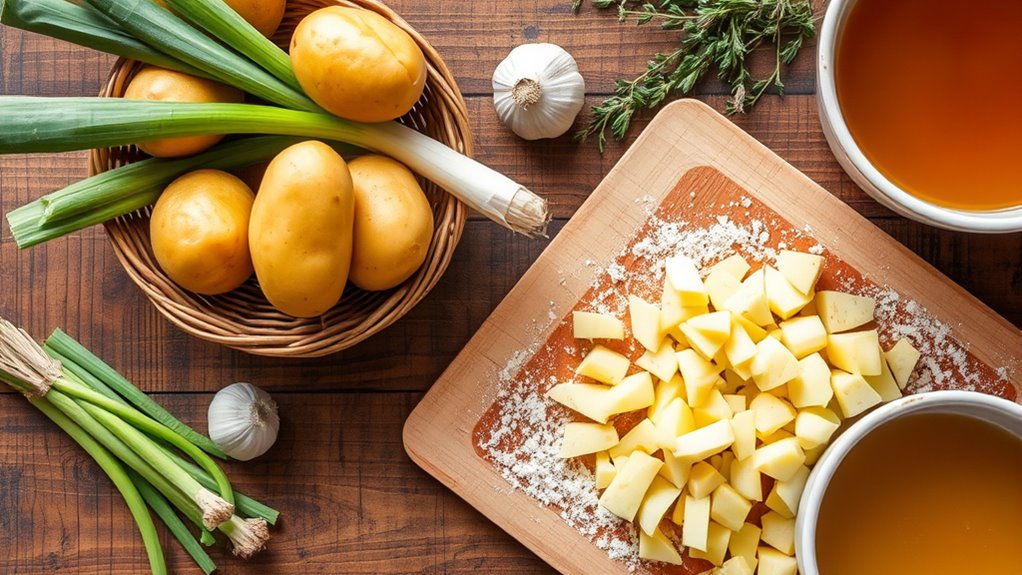
To make potato soup, gather these core ingredients: potatoes (about 1.5 to 2 pounds, peeled and diced), onions (1 medium, chopped), garlic (2 cloves, minced), butter (2 tablespoons), chicken or vegetable stock (4 cups), milk or cream (1 cup), salt (to taste), and pepper (to taste). You’ll pick potato varieties based on texture and flavor, then balance with careful seasoning options to support freedom in taste.
| Insight | Impact |
|---|---|
| Varieties influence creaminess | Guides you to fresh, confident choices |
| Seasoning options shape soul | Encourages intentional flavoring |
Keep measurements precise; rely on evidence: stock plus dairy creates a stable base, while salt and pepper finish.
Preparations

Preparing the soup starts with handling the potatoes, onions, and garlic from your ingredients list. You’ll choose sturdy bases, trim blemishes, and rinse well, preparing for consistent texture. Then you’ll decide how to season and how to slice for even simmering.
1) Potato selection: pick firm potatoes with even size for uniform cooking, avoiding green spots.
2) Prep rhythm: cube to a uniform size, so each bite cooks at the same rate.
3) Seasoning options: consider salt, pepper, and a touch of paprika or onion powder to boost flavor without dairy.
Evidence suggests that even cuts and deliberate seasoning yield a creaminess from starch, not milk, while preserving freedom to taste.
Kitchen tools or Kitchenware Required
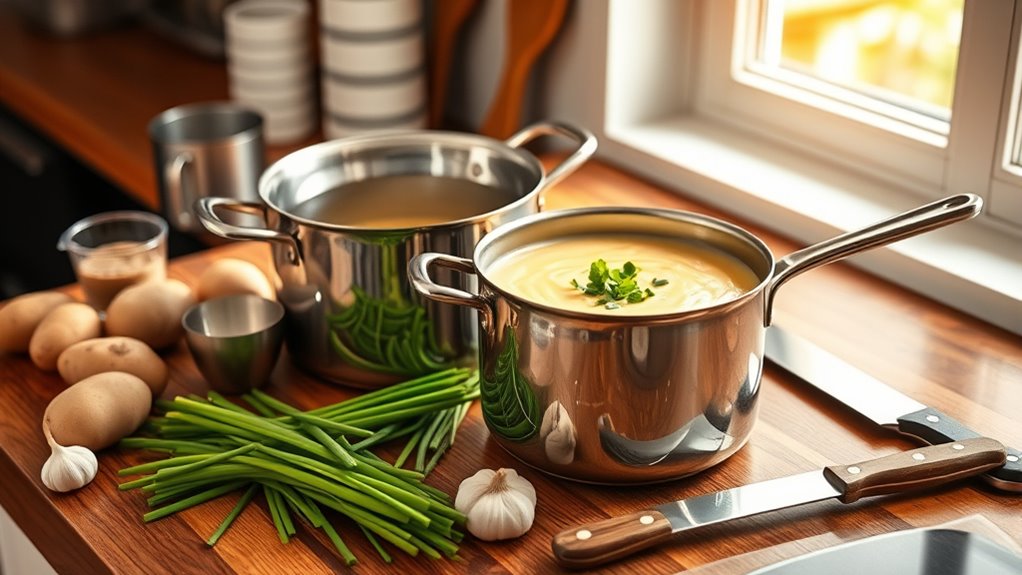
A well-equipped kitchen makes potato soup simpler and quicker to prepare. You’ll want reliable tools that cut prep time without fuss. For this no-milk approach, focus on a sturdy pot, a sharp knife, a cutting board, and a heatproof stirring spoon. A good blender or immersion blender helps smooth texture if you prefer creamy consistency. Kitchen gadgets like a potato masher, garlic press, and a timer add efficiency, while essential utensils include measuring cups and a ladle for serving. Visual map below shows practical pairings:
| Tool category | Purpose | Benefit |
|---|---|---|
| Pot & lid | Simmer soup | Even heat, prevents spills |
| Knife & board | Chop vegetables | Precision and safety |
| Blender/immersion | Smooth texture | Creamy without dairy |
How to Cook
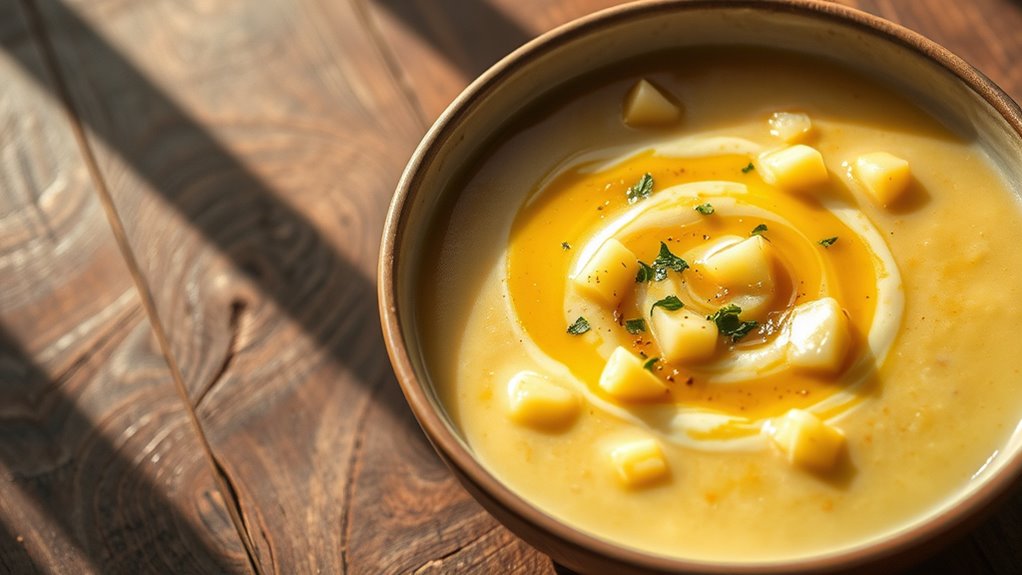
- Heat a sturdy pot over medium heat.
- Add a small amount of oil.
- Sauté aromatics like onion and garlic until fragrant.
- Simmer gently to break down starches, creating a creamy texture without milk.
- Taste and adjust salt, pepper, and optional herbs for balance.
- Finish with a splash of broth and a brief simmer to unify flavors.
- Focus on technique, not excess, letting the potatoes shine through simple adjustments.
- Use timing, onion browning, and careful seasoning to enhance flavor.
- Enjoy a comforting, dairy-free soup that respects your freedom and preferences.
How to Serve
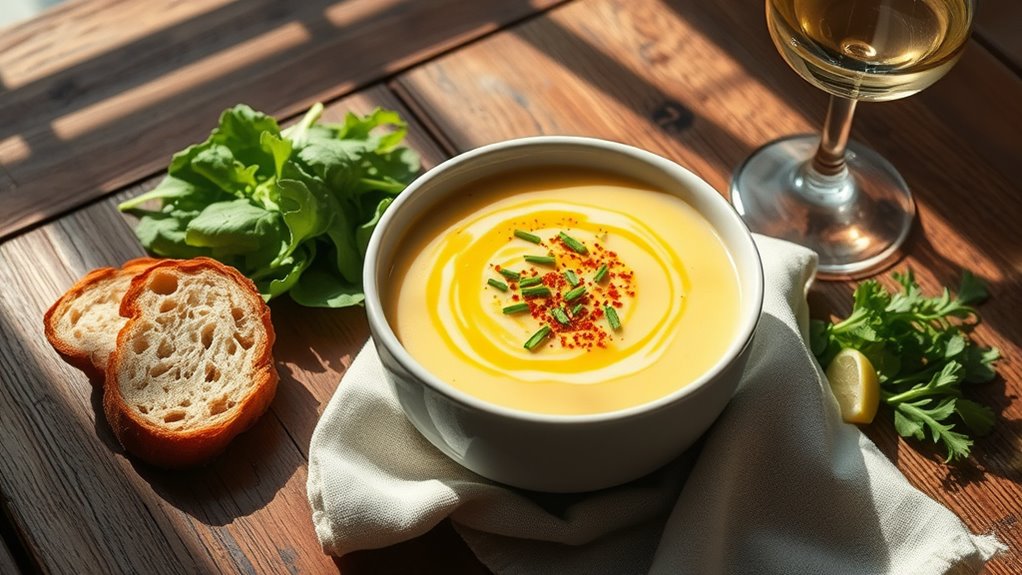
Serve potato soup in warm bowls with a splash of extra broth or a drizzle of olive oil to highlight a creamy, dairy-free texture; offer crusty bread or a light green salad on the side for balance. You’ll want serving suggestions that emphasize warmth and comfort without heaviness. Sip first to gauge seasoning, then adjust with pepper, chives, or paprika for subtle aroma. Garnish ideas should enhance color and texture without masking flavor—think a dollop of dairy-free yogurt or a sprinkle of roasted garlic crisps, scallion greens, or fresh dill. Consider portions that fit a standard meal mindset, not a snack. Plate cleanly, pair with a beverage that complements the broth’s depth, and note leftovers reheat smoothly for future meals.
Tips
To keep potato soup creamy without dairy, start with a roux or blend a portion of the potatoes for natural starchiness, then thin with warm broth as needed. You’ll find that small adjustments yield big results, so focus on texture, not just taste. Here are practical tips:
To keep potato soup creamy without dairy, blend some potatoes and use warm broth to adjust texture.
1) soup variations: switch up toppings and add-ins to alter mouthfeel without dairy, such as roasted garlic or chives.
2) seasoning tips: taste early, then finish with a brightness boost—lemon juice or vinegar can sharpen flavors without dairy.
3) balance: make certain salt and pepper complement the starchiness; too much salt hides depth.
Evidence-based note: adjust thickness with broth rather than more starch for consistent consistency.
Food Value and Benefit
Potato soup delivers comforting nutrition made with simple, real ingredients.
Food Value of Prepared Dish:
- Provides steady energy from complex carbohydrates in potatoes.
- Contains a modest amount of protein.
- Includes fiber from potato skins and resistant starch formed when cooked and cooled.
- Made with herbs and broth that add minerals and flavor without excess fat.
- Low in fat, especially when dairy is omitted.
- Balanced sodium levels, with the option to add vegetables for additional micronutrients.
Benefits of Eating This Recipe:
- Supports gut health and promotes feelings of fullness due to fiber and resistant starch.
- Supplies essential vitamins such as vitamin C and B vitamins.
- Provides important minerals including potassium.
- Helps maintain consistent energy levels throughout the day.
- Contributes to a balanced, varied diet with lower fat and sodium content.
- Encourages clearer meals and greater dietary freedom by using wholesome, natural ingredients.
Frequently Asked Questions
Can I Add Dairy-Free Creaminess Without Milk?
Sure—yes, you can, and you’ll love it, right off the bat. You can use coconut milk or cashew cream to add dairy-free creaminess without milk, creating a silky texture and rich flavor that supports your freedom to cook boldly.
Is This Soup Gluten-Free-Safe for Celiacs?
Yes, this soup can be gluten-free if you use certified gluten-free ingredients and no cross-contamination; watch for added thickeners. You’ll reduce Celiac symptoms by choosing gluten free alternatives, and feel freedom with careful labeling and kitchens awareness.
Can I Batch-Freeze Potato Soup Without Separation?
Yes, you can batch-freeze without separation. To prevent soup separation, chill quickly, use an immersion blender briefly after reheating, and freeze in portions with minimal air. Batch freezing works best with fats emulsified and stored airtight.
Are There Low-Sodium Options for This Recipe?
Yes, there are low-sodium options you can use. Choose low-sodium broth, reduce added salt, and boost taste with flavorful herbs. This approach supports evidence-based flavor without excess sodium, aligning with your freedom to cook confidently.
What Is the Best Garnish for Flavor Boost?
You’ll want herb toppings for bright, fresh flavor and crunchy croutons for texture contrast. Evidence suggests pairing herbs like chives or parsley with toasty croutons enhances aroma, balance, and perceived richness while keeping you in control and satisfied.
References
- https://www.wholesomeharvest.com/potato-soup-recipe-no-milk
- https://www.foodnetwork.com/recipes/articles/how-to-make-soup
- https://www.heart.org/en/healthy-living/healthy-eating/eat-smart/nutrition-basics/vegetable-soup-recipe
- https://www.ncbi.nlm.nih.gov/pmc/articles/PMC7072264/
- https://www.jamesbeard.org/recipes/potato-soup-no-milk
- https://www.cookinglight.com/recipes/potato-soup-no-milk
- https://www.extension.iastate.edu/food/recipes/potato-soup
- https://www.nutrition.gov/recipes/potato-soup-no-milk
